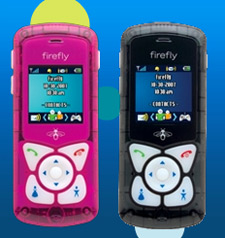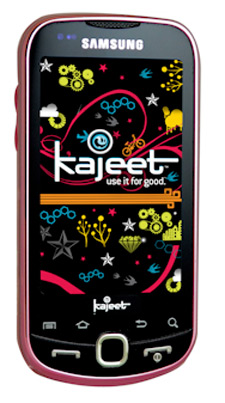Cell Phones and Kids
In Brief
When and if a child should get a cell phone is ultimately a parental decision. Kids want cell phones for games and social communication. Parents want their kids to have a cell phone for safety. When you give your child a cell phone, you are giving them a portable computer with mobile Internet capability. Know a phone's features and capabilities before you purchase. It's important to discuss issues of privacy, inappropriate texts/photos, and safety. For parents wanting extra safety features, there are special phones designed just for kids.
 It's a fact: just about everyone in America has a cell
phone. There are now more activated cell phones than
there are people in the United States.[1] Kids are no exception. The average
age for a kids' first cell phone is just over 11 years
old.[2] 77% of kids ages 12-17 have a cell
phone.[3] Cell phones are the primary form of communication
for teens; and they send more texts in a month than they
do phone calls.[4] With statistics like that, cell phones need to
be a primary focus for safety.
It's a fact: just about everyone in America has a cell
phone. There are now more activated cell phones than
there are people in the United States.[1] Kids are no exception. The average
age for a kids' first cell phone is just over 11 years
old.[2] 77% of kids ages 12-17 have a cell
phone.[3] Cell phones are the primary form of communication
for teens; and they send more texts in a month than they
do phone calls.[4] With statistics like that, cell phones need to
be a primary focus for safety.
Why do kids want a cell phone?
Try Googling the question, "Why do kids want a cell phone?" Guess what? You won't find the answer! Instead, you'll be presented with countless sites giving you advice on whether or not your childneeds a cell phone. That's not the same thing!
For younger kids, cell phones are cool. Older kids have them and cell phones are a gateway to get cool games, movies, and music. For older kids, much of their social world now exists through digital communications. Talking, texting, IM, email, video messages, and social media are all part of this reality. This is how their friends are communicating. Your kids will want to be part of that social circle too. It's critically important that you understand this dynamic. The point here is simple: the reasons why your child wants a cell phone are probably not the same reasons why you want to give them a cell phone. Don't avoid this communication gap. Talk about it with your kids so that you can both understand each other better and communicate your mutual expectations. A common way to communicate expectations is through a "Responsible Cell Phone Use" contract. There are many available online. If you feel a contract is right for your family, then we recommend this contract from the CTIA and ConnectSafely as a starting point:
http://www.wirelessfoundation.org/Files/FamilyCellPhoneContract.pdf
Cell Phone Safety Topics to Discuss with your Kids
Giving a kid a cell phone can open up a host of additional behaviors because today's phones allow you to do so many different things. Before you give your child a cell phone, it's important to discuss the following topics with your kids, assuming they are of appropriate age:
- Distracted driving: Distracted driving can be deadly. Kids should understand that texting, answering email, surfing the web, or any other cell-phone activity can cause a deadly accident. If they need to use a cell phone, teach them to pull over.
- Cheating: Cheating in class isn't just copying and passing notes any more. Cell phones are used to cheat in school. Openly talk to your kids about the ethics of cheating and the temptation a cell phone could present.
- Sexting: Sexting is sending a sexually explicit text, photo, or video via text messaging. Sexted photos or videos are frequently shared and don't stay solely with the intended recipient. A kid's reputation can be damaged for life. Peer pressure can lead a kid to sexting. Talk to kids about the dangers of sexting, peer pressure and immediately reporting any sexting.
- Cyberbullying: Cyberbulling is bullying with electronic media—cell phones included. Kids can be both victims and bullies. Talk to kids about what to do if they are bullied and remind them not to bully others.
- Geolocation: Geolocation uses your cell phone to determine your exact location in real-time. Approximately 18% of adult cell phone users use geosocial services to "check-in" to places.[5] Children thirteen and under should never use geolocation services to reveal their current location. Teach kids about appropriate and inappropriate uses of these services and how they can invite predators and compromise your family's safety and security.
When Should I get my Child a Cell Phone?
In case you are wondering, there is no "best age" for when a child should get a cell phone. That is ultimately a parenting decision and depends upon each family's particular needs and circumstances. Common Sense Media has put together the following questions to help you work through that tough parenting decision.[6] If you can answer "yes" to most of these questions, then it just may be time to consider getting a cell phone for your child:
- Are your kids independent?
- Do your children need to be in touch for safety reasons?
- Would having easy access to friends benefit them for social reasons?
- Do you think they'll use a cell phone responsibly – for example, not texting during class or disturbing others with their phone conversations?
- Can they adhere to limits you set for minutes talked and apps downloaded?
- Will they use the text, photo, and video functions responsibly and not to embarrass or harass others?
Approximately 95% of parents who buy their kids a cell phone do so primarily for reasons of safety and to keep in touch with their kids better and for safety.[7] Our guess is that you probably fall into that same 95%.
Even though kids are getting cell phones at younger and younger ages, parents generally don't do a good job of setting usage guidelines or discussing important topics like privacy, inappropriate texting and photo sharing, and safety basics. If you are getting your child a cell phone for communication and safety, then make sure that it is spelled out clearly and that you also understand the additional power you are putting into the hands of your child.
Don't be fooled: cell phones are not simply mobile telephones. Today, these devices are extremely powerful, mobile computers with access to the Internet and lots of content. So remember, anytime you give your child a mobile phone, you are giving them a mobile computer. We suggest you develop your parenting strategy with that in mind.
Because you're reading this guide we know that you want to act responsibly. We've assembled a parental checklist below to help you when buying a cell phone for your children.
Parental Checklist for buying a cell phone
When you decide it is time to purchase a cell phone for your child, knowledge is power. Don't be afraid. Ask questions—lots of them. It's important for you to know exactly what you are buying so that you can make an informed decision. Only then will you know what to discuss with your child. Here is a suggested list of questions to ask at the store:
- What capabilities does the mobile phone have? Find out if the device can access the Internet, send email, take pictures or videos, and download music, movies or apps.
- Can any of the mobile phone's capabilities be selectively disabled or turned off? Can you disable the camera, Internet access, YouTube, or other features? Can you set ratings for music and movie access?
- What is included in the cell phone plan? Find out if text messaging, email, Internet access, and app store access are included. Find out what additional features may be activated at a later time from the device without your explicit authorization. Likewise, find out what features have a limit. If you go over that limit, what will you end up paying?
- Are there parental controls and restrictions available for this device? What does your cell phone provider offer for selectively restricting calling, texting, time of day usage, and other features for the device? How can you selectively turn on those restrictions? How can you view reports? If you enable any filters or controls, how can you prevent them from being circumvented? Will the store help you setup any parental controls and teach you how to keep them effective going forward?
- Does the phone have a GPS (also called location services)? If so, are those location services enabled by default? Do they tag photos with the time and place where they were taken? Can you use the location services securely to find the location of the phone in an emergency?
Making the decision to give your child a phone is not an easy one. However, when you do finally make that decision as a family, we urge you to have an open and honest dialogue that begins before your buy the cell phone and continues frequently after you've made the purchase.
Carrier-Provided Parental Controls for Cell phones
You may not know it, but all major US cell phone carriers provide parental controls for cell phones. However, you must manually enable parental controls. They are not automatically activated for any cell phone that you give to a child and the controls don't necessarily work on all cell phones.
Parental control options are activated through your carrier's web site. Unfortunately not all services are equal. Some carriers' parental features are better than others. If you cannot see how to activate parental controls through your carrier's web site, simply contact your carrier's support for instructions specific to your service. Depending on your provider, there may be a monthly cost for the parental control service.
Here is a list of links to the major mobile phone carrier's parental control solutions:
AT&T Smart Controls: http://www.att.net/smartcontrols-WirelessParentalControls
T-Mobile Safety and Security: http://family.t-mobile.com/safety-and-security
Sprint Safety, Security, and Controls: http://shop.sprint.com/mysprint/services_solutions/
Verizon Safeguards: https://wbillpay.verizonwireless.com/vzw/nos/safeguards/safeguardLandingPage.action For online tutorials for Verizon control options, see: http://responsibility.verizon.com/online-safety
Parental Controls for the iPhone and Android
Provider-based controls won't work on the iPhone and Android phones. You'll need to either settle for the built-in parental control options on the device itself, which are not very flexible, or use some of the parental control apps available for the iPhone and Andriod. If you need more extensive parental control options then look at SafeEyes mobile at www.Internetsafety.com or Mobicip at: www.mobicip.com.
Cell Phones Made Just for Kids
If you just want a cell phone made for kids, then the good news is that there are several options. If you currently have a cell phone plan with one of the major carriers, contact them about their kid-friendly phone offerings. Sprint and T-Mobile have specific plans for kids while Verizon and AT&T have lackluster offerings.
Good options for parents are Kajeet (www.kajeet.com) and FireFly Mobile (www.fireflymobile.com). These two companies offer a nice selection of kid-friendly cell phones and plans with parents in mind. You can block unwanted calls, set time limits for phone usage, prevent access to web sites, set school-accepted usage limits, and find your child with the built-in GPS feature. Evaluate the offerings of both companies and your cell carrier to see which one has the best solution for you and your family.
Kajeet and Firefly Mobile offer kid-friendly cell phones and plans

|

|
[1] http://www.ctia.org/media/industry_info/index.cfm/AID/10323 Current CTIA statistics
[2] http://www.smartphoneparenting.com/survey.html July 2011 Parenting.com and Verizon Wireless survey
[4] http://pewInternet.org/Reports/2010/Teens-and-Mobile-Phones.aspx Pew Internet & American Life Project report, Teens and Mobile Phones
[5] http://www.pewInternet.org/Reports/2012/Location-based-services.aspx Pew Internet & American Life report, Three-quarters of smartphone owners use location-based services.
[7] http://www.smartphoneparenting.com/survey.html July 2011 Parenting.com and Verizon Wireless survey
Family Discussion Starters
When you get a child a cell phone, you probably do so for increased safety and reliable communication. Your child likely sees their new cell phone a gateway to social communication with their friends or as an exciting new toy. They may not understand the implications of some of the new capabilities in their hands. It's important to set expectations and help your child understand that some of those "cool" features (like texting or song downloads) may end up costing you a lot of extra money on your monthly bill. Here are some questions to get the dialogue started.
What is the reason for you getting a cell phone?
What are some of the things that excite you most about your new phone? How do you plan to use it? What features do you love most? What are the right ways to behave with those features?
What are appropriate times to use your cell phone? What are some inappropriate times?
What are your school's rules for appropriate and inappropriate cell phone usage?
Do you know that your cell phone costs money each month? What are some of the features your phone has that you think cost extra money each month?
Should you let your friends use your phone if they ask?
Parent's Checklist:
- Mutually decide on when it is appropriate for your child to have a cell phone.
- Consider cell phones and plans tailored just for kids.
- Have a list of questions about features and plan options at the time of purchase.
- Discuss and set rules for cell phone safety and usage.
- Consider parental controls from your cell carrier or kid-friendly cell phones.
- Report bullying or sexting.




